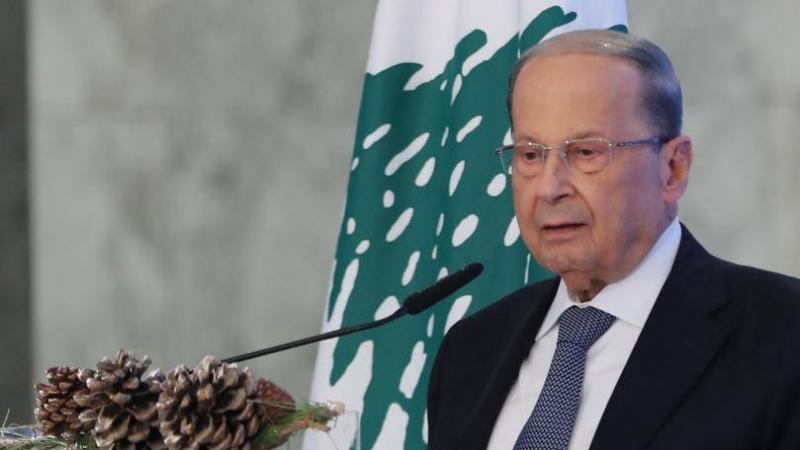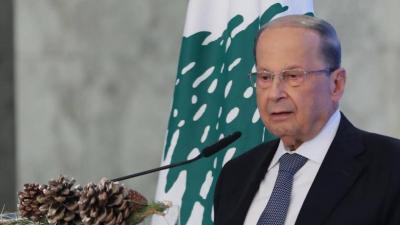Michel Aoun does not tire from battles; he enjoys standing on the front lines of conflict. He is not one to retreat, even if the repercussions of his fights are adverse and their outcomes negative. In the presidency, just as before and likely continuing afterwards, he moves from one battle to another. He knows how to create his adversaries and how to lure them into his conflicts. He accuses them of obstructing the course of his term, while on the other hand, he claims strength in facing them. He will not leave the palace and allow them to thrive in their governance. In his mind, there are many ideas for continuing the confrontation, even if they are futile or contribute to further collapse.
**Last-Minute Withdrawal**
His latest significant issue, through which he seeks to conclude his term, is the maritime border demarcation file. The "bite" was nearly in his mouth but was suddenly pulled away at the last moment. Before entering these negotiations, Aoun had rushed to announce Lebanon as an oil state and to join the oil club. In 2020, alongside Hassan Diab, the general boarded the exploration ship for gas in Block 4 off the coast of Batroun, ultimately declaring victory. Just a few months later, Total announced that there were no oil reserves, which the general refused to believe, considering it a conspiracy—a man who has spent his life facing plots and conspiracies or setting them for his opponents.
**"It Is in My Powers"**
At the same time, he sought to take the negotiation file for the maritime demarcation from President Nabih Berri, only succeeding after the announcement of the framework agreement. At that point, he took over the file, pushing for higher stakes and expanding the area from 860 square kilometers to 2,290 square kilometers. He replaced Line 23 with Line 29. He launched a fierce campaign against some ministers in Diab's government who refused to sign the amendment to Decree 6433, and after signing it himself, he refrained from proceeding. He placed the new decree text in a drawer and began new negotiations, claiming to both close allies and distant ones that this file is within his jurisdiction according to Article 52 of the constitution.
**Underhanded Strikes**
Negotiations in Naqoura failed due to the Lebanese negotiating delegation's insistence, supported by Aoun, on Line 29. The Israelis withdrew, and the Americans turned to shuttle diplomacy through their mediator Amos Hochstein. Simultaneously, while negotiating with an enemy—Israel—Lebanon was also facing underhanded strikes regarding its rights between Aoun on one side and Nabih Berri on the other. Some interpreted that Aoun, by proposing Line 29, aimed to outbid Berri by proving his capability of achieving more, while also negotiating with the Americans regarding sanctions imposed on Gebran Bassil. The negotiation game dragged on, with Hezbollah entering the fray with threats to expedite it. Hochstein presented a written proposal, to which Nabih Berri responded, calling it a “peak and a half” regarding the suggestion, while Lebanon went ahead to submit its observations—observations that undermined the moment of agreement and pushed for its postponement. Aoun was left disappointed. Deep down, he placed the blame on Nabih Berri and Najib Mikati, convinced that they were fighting to prevent the signing of the agreement during his term. He rejected this, while negotiations continued to try to salvage and ratify the agreement before the thirty-first of the month.
**Return to Battle**
Nevertheless, the man did not abandon the fight. Following the Israeli rejection of the Lebanese observations and the "media thuggery" displayed by Israeli officials hinting at escalation for the sake of elections, Lebanon remained adamant about negotiating and achieving the agreement before the Israeli elections. Aoun introduced a new weapon with his statement during the reception of the Assistant Secretary-General of the Arab League, Hossam Zaki, where he said: "The absolute priority must currently be the election of a new president, as the presence of the president is essential for forming a new government, not the other way around." Aoun added that "a country like Lebanon, with its unique characteristics and diversity, cannot achieve national partnership and pacts in the absence of a president." This position was aimed at turning the tables on his fierce opponents, holding them responsible for the vacuum as if paving the way for another step. He suggested that if the demarcation agreement is not achieved, and if a government is not formed, he would resort to whatever he deems fit to retaliate, whether by refusing to relinquish authority or by issuing a decree to dismiss Mikati’s caretaker government, a move that would likely be accompanied by Aounist action in the streets. The general thus returns to his youth and renews himself by returning to battle.




